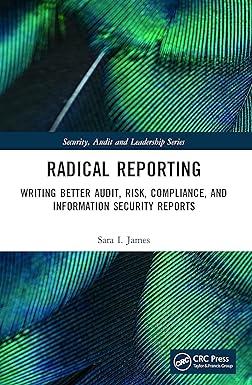Question
Suppose you are working for a financial institution and you are asked to implement a fraud detection system. You plan to use the following information:
Suppose you are working for a financial institution and you are asked to implement a fraud detection system. You plan to use the following information: When the card holder is travelling abroad, fraudulent transactions are more likely since tourists are prime targets for thieves. More precisely, 1% of transactions are fraudulent when the card holder is travelling, where as only 0.4% of the transactions are fraudulent when she is not travelling. On average, 5% of all transactions happen while the card holder is travelling. If a transaction is fraudulent, then the likelihood of a foreign purchase increases, unless the card holder happens to be travelling. More precisely, when the card holder is not travelling, 10% of the fraudulent transactions are foreign purchases where as only 1% of the legitimate transactions are foreign purchases. On the other hand, when the card holder is travelling, then 90% of the transactions are foreign purchases regardless of the legitimacy of the transactions. Purchases made over the internet are more likely to be fraudulent. This is especially true for card holders who dont own any computer. Currently, 75% of the population owns a computer or smart phone and for those card holders, 1% of their legitimate transactions are done over the internet, however this percentage increases to 2% for fraudulent transactions. For those who dont own any computer or smart phone, a mere 0.1% of their legitimate transactions is done over the internet, but that number increases to 1.1% for fraudulent transactions. Unfortunately, the credit card company doesnt know whether a card holder owns a computer or smart phone, however it can usually guess by verifying whether any of the recent transactions involve the purchase of computer related accessories. In any given week, 10% of those who own a computer or smart phone purchase (with their credit card) at least one computer related item as opposed to just 0.1% of those who dont own any computer or smart phone. Please answer the following questions: 1. Construct a Bayes Network to identify fraudulent transactions. 2. What is the prior probability (i.e., before we search for previous computer related purchases and before we verify whether it is a foreign and/or an internet purchase) that the current transaction is a fraud? What is the probability that the current transaction is a fraud once we have verified that it is a foreign transaction, but not an internet purchase and that the card holder purchased computer related accessories in the past week? 3. After computing those probabilities, the fraud detection system raises a flag and recommends that the card holder be called to confirm the transaction. An agent calls at the domicile of the card holder but she is not home. Her spouse confirms that she is currently out of town on a business trip. How does the probability of a fraud changes based on this new piece of information?
This is a complete question....
Step by Step Solution
There are 3 Steps involved in it
Step: 1

Get Instant Access to Expert-Tailored Solutions
See step-by-step solutions with expert insights and AI powered tools for academic success
Step: 2

Step: 3

Ace Your Homework with AI
Get the answers you need in no time with our AI-driven, step-by-step assistance
Get Started


